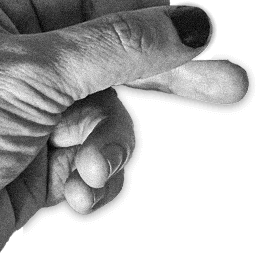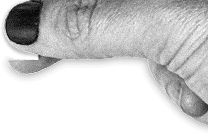
the many facets of depression & treatment
Documenting Depression: Visiting The Psych Ward
If you've got someone you're close to with depression, there is a chance you'll visit them in the psychiatric ward of a hospital. Visiting the psych ward is an experience, and each one is different. This is my experience.
All names have been changed for privacy purposes.
Carrie: Schizophrenia, Depression, Anxiety. Committed due to alcohol abuse & hearing voices.
Joe: Schizophrenia, PTSD, ADHD, Depression, Anxiety. Self-committed for reasons unknown.
Billy: Heroin Addiction. Committed because he ODed.
Logan: Schizophrenia. Petitioned by the courts to be committed for reasons unknown.
I was visiting another friend in the psychiatric ward recently. This is my first time visiting the psych ward, and it wasn't easy.
When I first arrived, I hit the buzzer to be let in. I had my bike bag full of stuff; Clothes and various things requested. Someone came out, let me into the lobby/locker room, and I emptied out my pockets, putting my bike bag in a provided locker. Ordinarily, they wouldn't allow my cane, but given my arthritis was particularly bad that day they let me keep it. They waved a metal detector wand over me, scrutinizing every beep for my buttons on my clothing.
Once I was cleared, I was escorted in, and was directed to the front desk to sign in and let them examine the clothing I brought. Some items aren't allowed, so a few items I had to take back with me when I left. Things that have skulls, profanity, and the like aren't allowed. Sleeveless clothing isn't allowed, but it is so cold in there that most people wouldn't want to be in a sleeveless shirt.
I proceeded with my friend to the day room, which is almost like a small cafeteria. There are tables, food, and more. Supervision is also there, ensuring nothing happens. Board & card games are provided, and if you would like a book, you can request it, assuming it is on the approved list.
The first thing you notice upon interacting with the people there is that they are all fairly normal. You'd expect to deal with all sorts of things when visiting the psych ward, but in my experience, everybody seemed like an average person that I might meet on an ordinary outing.
Carrie's a friend of my friend I was visiting. We had perfectly innocuous conversation; my friend let me know about Carrie's illness, chief of which is schizophrenia.
Apparently, hearing voices is quite a bit different from what I had understood; instead of a voice inside your head, you hear a voice as clear as day, as if it was coming from someone right in front of you.
Carrie is doing well, but will be transferred to a state hospital soon.
Joe was an interesting guy. He was extremely relaxed; he has a history of drug & alcohol abuse, but you wouldn't know it by talking to him. Soft spoken, his affectation is that of an easy-going, average guy. If you push his buttons in the wrong way, though, he can react very negatively. He never reacted that way with me, but this is what I was told from the various people I talked to.
Joe was released Monday, just a couple days after my visit.
Billy is not someone you would expect to find when visiting a psych ward, but it makes sense. Suffering from addiction to heroin, Billy nearly killed himself taking too much. He seemed well, having been admitted a couple days before I visited. He was in the hospital for observation after his experience, and then transferred to the psychiatric ward. He was friendly, open, and honest about everything. I think everybody liked Billy.
Billy was released Sunday, just a day before Joe, and from what I understand is already using again.
Logan, the last person I want to share with you, was a challenge. I had no direct interaction with him; I just observed his interactions with the other patients. Logan almost paints the picture of the stereotypical "crazy person", but it isn't quite that simple. I could see myself running into Logan, and not enjoying the experience, but I wouldn't assume anything about his mental state aside from one thing.
Logan is extremely religious, and proselytized the other patients on a near-constant basis. Everything was related to his Christianity. His actions, though, put him at odds with the rest of the patients, which at some points required intervention from the staff before it escalated.
Logan was frequently bothering the other 3 patients I mentioned; some, like Carrie, didn't have the strength to tell him to leave her alone. Others stood up for her, though, and Logan eventually moved on to other people.
Logan, like Carrie, is getting transferred to a state hospital.
The one common theme I observed with my interactions with all of these people is this:
The psych ward was a waste of time, and, in some cases, made them feel even worse.
Not all psychiatric wards are like this. Some are actually really good; I've heard stories of ones where people left and never turned back, feeling stronger and happier as each day went by.
While visiting the psych ward in this story, though, I found that most people despised the experience. The only interaction with a doctor was for a few minutes in the morning. There was no specific assistance for each individual's needs. Only the most extreme issues get any attention, and even then, it seems that the experience does little to help.
For the most part, these people were just.. bored. Trapped, not unlike Sartre's No Exit, only being able to interact with their fellow patients. They can only hold a person so long, and for that short period of time, very little seemed to be done to help those who needed it. Many people, like Billy, end up right back where they were when they were admitted. Most have been in this psych ward repeatedly.
Many will come back again, assuming they survive. Without a good support structure on the outside, they may never get better. They may hurt themselves, or others. Ultimately, though, this won't be the last time they spend time inside a psychiatric hospital.
See the rest of the articles documenting depression here.
Depression affects about 6.7% of adults in the U.S., according to the Anxiety and Depression Association of America. It is also among one of the many misunderstood illnesses that affect society.
Depression isn’t something that can just be turned off. You can’t stop hurting. You can’t “buck up”, “focus on the positive”, or anything else that many people will tell you to do when you’re suffering from clinical depression.
If you know someone who is suffering from depression, please, try to understand what they are going through and support them instead of telling them to cheer up. If you suffer from depression, just know that you’re not alone, no matter how much it feels that way. If you feel like there is no way out, or just need some help, check out NAMI’s support page.


